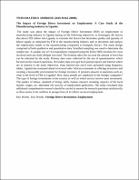| dc.contributor.author | Twinamatsiko, Ambrose | |
| dc.date.accessioned | 2018-11-17T12:59:15Z | |
| dc.date.available | 2018-11-17T12:59:15Z | |
| dc.date.issued | 2012 | |
| dc.identifier.citation | Twinamatsiko, A. (2012). The Impact of Foreign Direct Investment on Employment: A Case Study of the Manufacturing Industry in Uganda. Uganda Martyrs University, Nkozi: Uganda Martyrs University. | en_US |
| dc.identifier.uri | http://hdl.handle.net/20.500.12280/1133 | |
| dc.description.abstract | TWINAMATSIKO AMBROSE (2010-M162-20008)
The Impact of Foreign Direct Investment on Employment: A Case Study of the Manufacturing Industry in Uganda.
The study was about the impact of Foreign Direct Investment (FDI) on employment in manufacturing industry in Uganda basing on the following objectives; to investigate the factors that attract FDI inflow into Uganda, to examine the factors that determine quality and quantity of labour supply as stimulated by FDI in the manufacturing industry and, to document and analyse the employment trends in the manufacturing companies in Kampala district. The study design comprised of both qualitative and quantitative data. Stratified sampling was used to determine the sample size. A sample size of 114 respondents computed using the Kish (1965) formula for cross sectional and case study designs was used. The formula takes into account the amount of error that can be tolerated by the study. Primary data were collected by the use of questionnaires which focused on the research questions. Secondary data were got from journal reports and internet which are in relation to the study objectives. Data entered into excel were presented using frequency tables. Uganda has remained ahead of several other African economies in offering incentives and creating a favourable environment for foreign investors. It presents answers to questions such as; what is the level of FDI in Uganda? How many people are employed in the foreign companies? The type of foreign investments in the country as well as which sectors receive most investment. The quality of labour, standard of living, skills, human resource retaining capacity of the local market, wages, etc. determine the success of employment generation. The study concludes that additional comprehensive research should be carried to answer the research questions satisfactorily as there seems to be conflicts in perspectives of its effects on local employment.
Key Words: Key Words: Foreign Direct Investment, Employment | en_US |
| dc.language.iso | en | en_US |
| dc.subject | Foreign Direct Investment | en_US |
| dc.subject | Employment | en_US |
| dc.title | The Impact of Foreign Direct Investment on Employment: A Case Study of the Manufacturing Industry in Uganda. | en_US |
| dc.type | Thesis | en_US |


